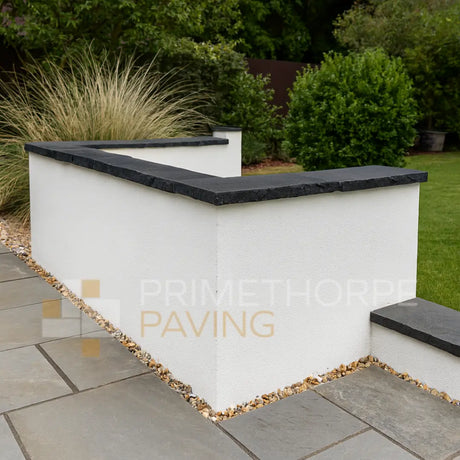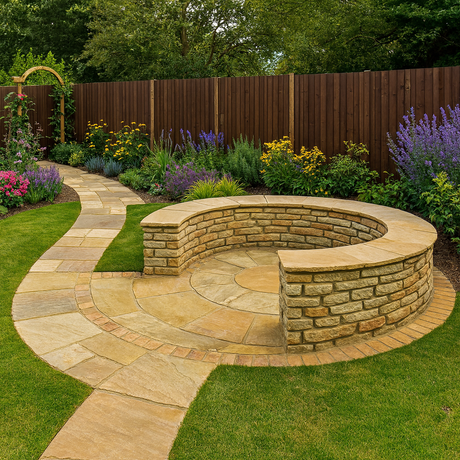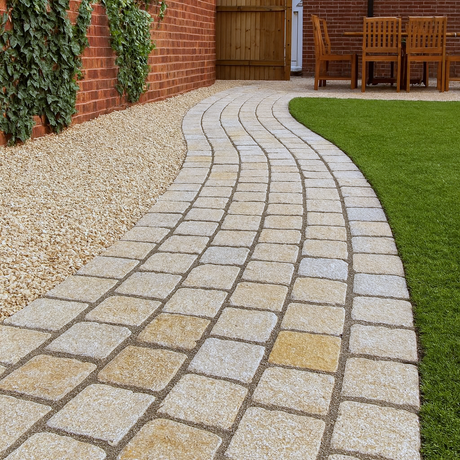Our porcelain garden tiles deliver exceptionally high performance in your garden. Generally speaking, porcelain tiles offers very low porosity levels. This means that they don’t absorb much water. The great thing about this is that the risk of stains or water damage is reduced. The low porosity of porcelain tiles also means that the tiles are very easy to clean, inside or out. These have been used commonly in kitchens and bathrooms for as long some can remember, but have only recently started to feature in gardens.
The Benefits of Both Outdoor & Indoor Porcelain Tiles
We would recommend purchasing rectified porcelain tiles for your home or garden. Rectified means that the porcelain tiles are processed to ensure that every tile or porcelain paving slab is precisely the same size. A rectified tile will also mean that every angle measures exactly 90-degrees.
It's a huge benefit to be able to guarantee the size, corners and thickness of a tile. Installations are easier to get perfect, slabs edges line up perfectly each time and they will be easier to keep the thickness the same. The benefits of laser-precise machinery cannot be overstated!
Shade Variation In Outdoor vs Indoor Porcelain Tiles
When thinking about porcelain garden tiles you may want to consider the shade variation. Porcelain tiles with a high shade variation rating means that you will notice an appealing level of variation in the colours and shades of your tiles. Homeowners tend to prefer a more consistent and uniform colour for their porcelain kitchen and bathroom tiles. In this case we would recommend a low shade variation rating of V2 for example. Meanwhile, homeowners often prefer a more natural look outside and prefer a high shade variation rating.
Porcelain tiles have so many variations due to the ease of applying the veneers, that you can even find yourself a wood effect paving slab that replicates the look of a deck, without the longevity issue.
The Anti-Slip Requirement For Outdoor Porcelain Tiles
If you are choosing porcelain tiles for outside, you need to consider the finish. High quality porcelain paving should come with an anti-slip finish. There are regulations that refer to the anti-slap nature of a paving slab, know as an "R-rating". Outdoor porcelain needs to be rated at least "R11" to be deemed safe. The textured veneer required to gain an R11 rating will help maximise the slip resistance offered underfoot. However, porcelain tiles for inside the home will have a smooth finish which can look more attractive in a bright, clean and spacious bathroom or kitchen. There is not as strict of a requirement for indoor use, R9 is often acceptable if area is going to be dry.
It is true that not all tiles should be used outside. However, porcelain is a great material for indoor and outdoor use. It’s just as good as a garden tile, bathroom tiles or kitchen tile. One thing to bear in mind when purchasing a porcelain tile for outdoor use is that it is an outdoor anti-slip tile. Ideally it should have a matt finish too, for extra natural grip underfoot. This will help with the prevention of accidents. These accidents may not be a big issue in the dry weather, but the slip-resistance is essential in wet weather or near pools and hot tubs, for example. This is why R11 is necessary at an absolute minimum.
The Longevity of Outdoor vs Indoor Porcelain Tiles
Porcelain is a great choice for garden paving because it is frost proof and easy to clean, it is also fade and scratch resistant. This is why it is a popular flooring option in car showrooms too. If you can drive a car across a porcelain tile without any worries, it is definitely a suitable paving product for your garden and will withstand everyday wear and tear. Outdoor tiles will definitely see more wear & tear as it is exposed to the elements, so it is worth making sure you are getting top quality tiles before purchasing. European manufactured tiles are the top option around the world, so while cheaper Asian or African tiles might be viable indoors, you should definitely consider sticking the best for your outdoor option.
The Thickness of Indoor vs Outdoor Tiles
Porcelain tiles work so well indoors and outdoors, they are a popular tile to unify internal and external spaces with one single, stunning design. However, it’s important to check the thickness of your tiles to ensure you use the right ones inside and outside. Indoor porcelain paving slabs will often be around 10mm in thickness. Meanwhile, outdoor porcelain paving will be around 20mm in thickness.
If you are looking to create a truly seamless and stunning transition between you indoor and outdoor living spaces, why not consider porcelain tiles? Contact our porcelain paving specialists to ensure you get the right tiles for your garden, bathroom and kitchen.
If you want to read a more extensive guide on porcelain paving, you can do so here.


.jpg)


.jpg)
.jpg)




